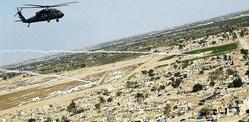
A United States (U.S.) helicopter prepares to land at a base in south-east Baghdad after releasing flares yesterday. Iraq Prime Minister Nuri al-Maliki has hailed a U.S.-backed security crackdown in Baghdad which has reduced sectarian death squad killings. - ReutersBAGHDAD (Reuters):
Prime Minister Nuri al-Maliki yesterday told insurgents fighting his United States-backed government to accept an olive branch or face a security crackdown that will cover "every inch" of Iraq.
The U.S. military said it was preparing to set up a security outpost in the Shi'ite militia stronghold of Sadr City "in the very near future" in what will be a test of Iraqi and U.S. determination to tackle one of the toughest areas of Baghdad.
Maliki also said he might announce a long-awaited Cabinet reshuffle within two weeks. He is expected to replace underperforming ministers in a revamp he has promised for months.
Reconciliation
Speaking at a conference aimed at speeding up reconciliation among Iraq'swarring factions, Maliki said political consensus could be achieved only if Iraq was stable.
Maliki has been pleased with the early results of a U.S.-backed security crackdown in Baghdad called Operation Imposing Law. The offensive has reduced sectarian death squad killing car bombings are still common.
Meanwhile, Iraqi forces backed by British troops found evidence of torture when they raided an Iraqi intelligence agency detention centre in the southern city of Basra yesterday, a British military spokesman said.
Officials at the detention centre, part of a police compound in the city, told Reuters yesterday that 37 prisoners were freed in the raid. They showed reporters offices that had been searched, with files thrown on the floor, desks overturned and doors broken open in the pre-dawn raid.
British Major David Gell said the raid on the National Iraqi Intelligence Agency detention facility in central Basra was part of an operation led by Iraqi forces.
"Five individuals were arrested on suspicion of serious terrorist activities including involvement in improvised explosive devices and attacks against both civilians and multinational forces," Gell said.
"The Iraqi counter-terrorist forces then exploited information received and that's when the National Iraqi Intelligence Agency building was subsequently struck," he said.
"We believe there were about 30 people found imprisoned in the building and there was evidence of torture," Gell said.

